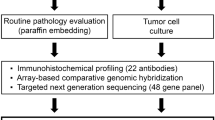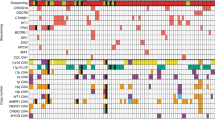Abstract
The HT29R human colonic adenocarcinoma cell line grows as locally invasive, mucin-secreting tumours in immunosuppressed mice with a doubling time of 6 days. These tumours may be disaggregated to give single-cell suspensions with plating efficiencies of 25-45% in technically simple in vivo-in vitro cell-survival assays. The effect of maximum tolerated doses of 5-fluorouracil, melphalan and cyclo-phosphamide on in situ growth is only slight. in vivo-in vitro cell-survival assays phosphamide on in situ growth is only slight. in vivo-in vitro cell-survival assays are consistent with these in situ results. The relative ease of experimental manipulation and the high clonogenic efficiency of this tumour make it a useful addition to human tumour xenograft models.
This is a preview of subscription content, access via your institution
Access options
Subscribe to this journal
Receive 24 print issues and online access
$259.00 per year
only $10.79 per issue
Buy this article
- Purchase on Springer Link
- Instant access to full article PDF
Prices may be subject to local taxes which are calculated during checkout
Similar content being viewed by others
Rights and permissions
About this article
Cite this article
Warenius, H., Bleehen, N. In vivo-in vitro clonogenic assays in a human tumour xenograft with a high plating efficiency. Br J Cancer 46, 45–50 (1982). https://doi.org/10.1038/bjc.1982.163
Issue Date:
DOI: https://doi.org/10.1038/bjc.1982.163
This article is cited by
-
An evaluation of novel real-time technology as a tool for measurement of radiobiological and radiation-induced bystander effects
Radiation and Environmental Biophysics (2016)
-
Predictive tests in cancer chemotherapy a reappraisal
Klinische Wochenschrift (1984)



